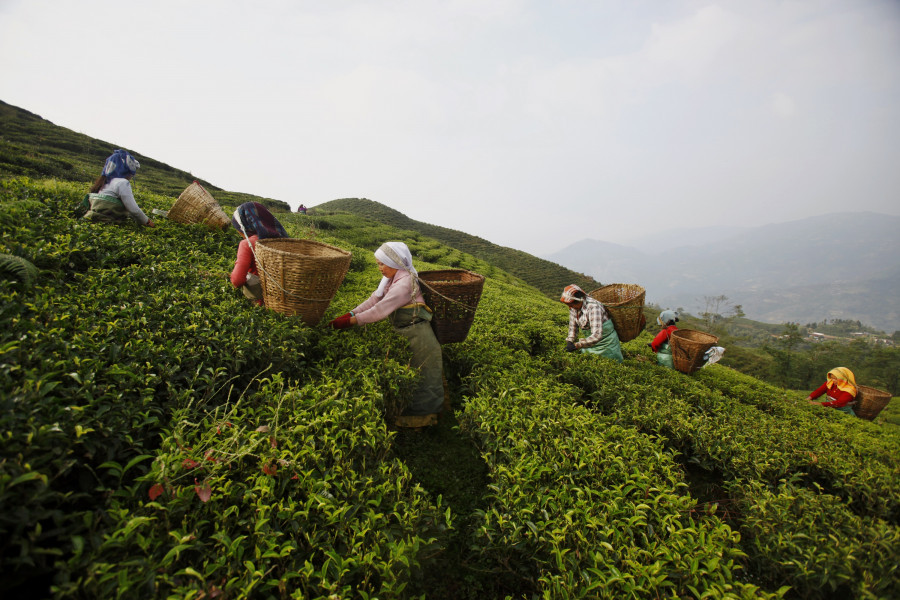Money
Lockdown-hit tea farmers complain about low prices for green leaves
The tea factories have fixed the price at Rs20 to Rs30 per kg for this year.
Biplav Bhattarai
Small tea growers in the eastern hill district of Ilam say the price set by tea factories for green leaves is not enough to cover their costs. The tea factories have fixed the price at Rs20 to Rs30 per kg for this year, depending on the quality.
Tea farmers hit by the lockdown said factory owners fixed the price of green tea leaves late in the season due to the government's stay-at-home order.
They eventually set the rate, but it is too low for the first flush which is regarded as quality leaves and is worth more, they said. The price is normally fixed in mid-March.
For their part, tea factory owners say it will be difficult to export tea to India which is their main market as the lockdown has affected cross-border trade and led to labour shortages.
The government had allowed tea estates to operate during the lockdown by enforcing social distancing rules and safety protocols for workers while plucking tea leaves.
As tea exports have come to a stop, factory owners have not been able to pay farmers for their tea leaves on a regular basis.
Farmers of Suryodaya Municipality, which is a large tea producer, have appealed to the city administration to prevail on the tea factories to raise the price of green tea leaves.
The farmers complained that the municipality had set a minimum price of Rs40 per kg and encouraged them to produce quality tea. Several rounds of talks have been held between the stakeholders over the price, but they were inconclusive.
"We have not been able to decide how to sell our tea harvest this time," said Dilliram Shrestha, vice-chairman of the Sunrise Tea Producers' Association. "We are farmers too, and we know that the price will not even cover our costs. But there is no situation to fix a high price," he said.
Shrestha said that no tea had been exported through the Kakarbhitta border point. Some shipments have been sent through the Indian state of Bihar, but the freight charges are too high. Stating that Nepali tea had hurt sales of Darjeeling tea, the factories there have been disrupting production for a few years, leading to a slowdown in imports.
Most factories in Ilam have tonnes of orthodox tea piled up in their warehouses. Factory owners say that it has become difficult to pay the farmers as they have more than 1 million kg of unsold stocks of finished tea. They added that they can't afford to pay the break-even price to farmers.
Tea farmers have been most severely hit by the coronavirus as the lockdown prevented regular plucking of tea leaves, their payments were held up and prices have fallen.
Picking tea leaves entails many expenses, and pricey fertiliser and medicine adds to the production costs. Farmers have not been able to recover their investment as the price of green tea leaves has dropped steeply.
"In this situation, the state should create an environment for the tea sector so that farmers can continue growing tea," said Bal Kumar Katuwal of Arubote, Suryodaya Municipality.
The farmers say there is no alternative to planting maize in their tea gardens as the crisis has worsened, and they have lost their livelihoods.
Tea industry insiders are worried that their export markets could be wiped out by the global coronavirus pandemic which would create a long-term problem.
Of the 5.5 million kg of orthodox tea produced annually in Nepal, 80 percent is shipped to markets in India, and 10 percent goes to Western markets.
The domestic market accounts for 10 percent of sales, and even that has evaporated as a result of the virus lockdown.
The factories that used to sell leaves at a good price in the domestic market have not been able to do anything besides processing tea and storing it in their warehouses.
Tea entrepreneurs say the industry is in crisis as finished tea only fetches IRs40-260 per kg in the Kolkata market in India.
The tea sector has an annual turnover of Rs4.5 billion and 20,000 farmers are engaged in commercial production. The sector provides 100,000 jobs. In Ilam alone, there are several small and large factories that process tea.




 22.12°C Kathmandu
22.12°C Kathmandu













